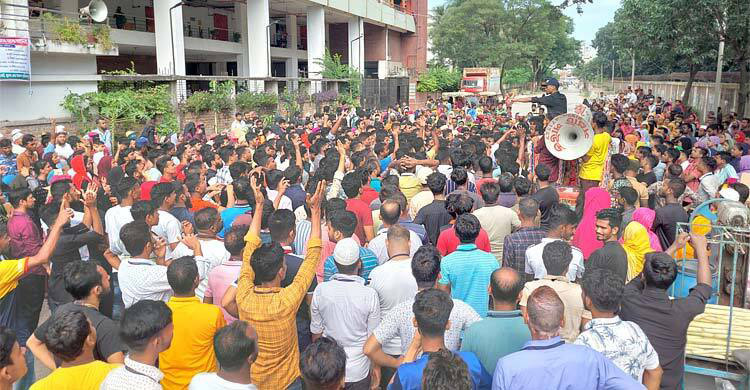Labour unrest, vandalism threaten manufacturing industries

Labour unrest in several manufacturing industries across the country has escalated, causing severe disruptions in production due to widespread attacks and vandalism.
Many factories have halted operations, leading to challenges in maintaining normal supply chains for both local and export markets.
Factory owners warn that continued unrest could lead to shortages in consumer goods, while exporters are struggling to meet delivery deadlines.
The situation also poses a risk to workers' jobs, as some factory owners may be forced to close their businesses due to damage caused by the unrest.
Business leaders express concern that if the turmoil continues without decisive action against those responsible, the overall business climate in the country will deteriorate further.
The unrest intensified after the fall of the Awami League government and the escape of Sheikh Hasina, which led to a significant decline in law and order as the police force lost control.
Although an interim government led by Dr Muhammad Yunus took charge, the situation in the industrial sector has not improved.
By late August, protests among workers surged again, with demands for better conditions.
Despite efforts by factory owners to meet most of the workers' legitimate demands, violent unrest—particularly in the ready-made garment industry and consumer goods sectors—has not abated.
Factory owners are dismayed by the violence. "We are shocked by the sudden escalation in aggression. Last month, workers' protests severely disrupted our production," said one entrepreneur.
A consumer goods manufacturer, speaking anonymously, told Jago News, "If the current situation worsens, it will be challenging to meet market demands. Exporters are particularly vulnerable, as we must ship products within strict deadlines."
The businessman added, "If worker unrest continues and production remains halted, we may be forced to offer discounts or resort to costly air shipments to meet deadlines."
Even companies that have met most of their workers' demands are suffering.
Mohammad Mohsin, General Manager (Special Affairs) of Cocola Food Products Limited, said, "We fulfilled 11 out of the 12 demands made by the workers, yet they continued protesting, influenced by outsiders. The result was widespread factory vandalism, causing around Tk 6 crore in losses and halting production."
Despite recent salary increases in January and promises of further hikes next year, dissatisfaction persists.
"Our production was halted for 10 to 12 days, leading to significant financial losses. If this volatility isn't brought under control, we will struggle to maintain supply due to ongoing production issues," Mohsin explained.
Md Iqtadul Haque, General Secretary of the Bangladesh Agro-Processors Association (BAPA), echoed these concerns: "Though we managed to control unrest after August 5, if further instability isn't prevented, it will be difficult to ensure the supply of essential food products in local markets."
Iqtadul urged the government to create a business-friendly environment to protect both the industry and the economy. Without swift action, both exports and local markets will be severely affected.
Exporters are particularly concerned about the impact on their global relationships.
"If the unrest continues, it will disrupt production and make it impossible to meet international shipping deadlines," said one exporter.
"Global buyers will lose confidence in us. Now is the time for strict measures to restore stability and protect our reputation."

